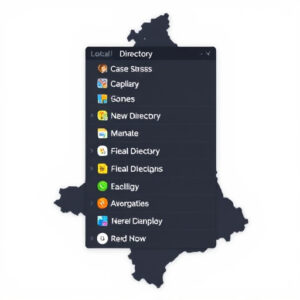Optimize Your Business Listings for Voice & Mobile Search Success
Optimizing Your Business Listings for voice-enabled devices and mobile platforms is essential in today's digital era, given the rise of smart speakers and on-the-go users seeking local options. To capture attention during local searches: ad…….

Optimizing Your Business Listings for voice-enabled devices and mobile platforms is essential in today's digital era, given the rise of smart speakers and on-the-go users seeking local options. To capture attention during local searches: adapt content to natural conversational queries, maintain accurate information across all platforms (including Google My Business), conduct keyphrase research tailored to voice assistants, craft compelling listings that drive user action, prominently display locality details, include rich snippets for better visibility and click-through rates, test and analyze listing performance using tools like Google My Business, and continuously optimize based on user interactions and algorithm updates.
In today’s digital era, optimizing your business listings for voice and mobile search queries is paramount. With voice assistants like Siri and Google Assistant handling millions of requests daily, understanding user behavior and tailoring listings accordingly is crucial. This article guides you through essential strategies, from deciphering voice search patterns to crafting conversational listings, leveraging locality, and enhancing with rich snippets. Discover how continuous optimization ensures your business listings stand out in a competitive market.
- Understanding Voice and Mobile Search Behavior
- Optimizing Business Listings for Voice Search
- Keyphrase Research for Voice Queries
- Crafting Conversational and Actionable Listings
- Leveraging Locality in Listings
- Enhancing Listings with Rich Snippets
- Testing and Analyzing Listing Performance
- Staying Ahead: Continuous Optimization Strategies
Understanding Voice and Mobile Search Behavior
Understanding how users interact with search engines on voice-enabled devices and mobile platforms is a key step in optimizing your business listings for relevant queries. With the rise of smart speakers and virtual assistants, voice search has become increasingly prevalent. Users often phrase their searches as natural questions, using language rather than specific keywords. This shift in behavior requires businesses to adapt their strategies to match these conversational patterns.
Mobile devices have also transformed local search dynamics, with users frequently seeking nearby options and services on the go. Reviewly and Local Search play a significant role in this scenario, as positive reviews and optimized business listings can greatly enhance visibility and attract potential customers. By considering both voice and mobile search trends, businesses can craft effective strategies to capture the attention of their target audience when they’re searching for products or services.
Optimizing Business Listings for Voice Search
To optimize your business listings for voice search, consider how people naturally speak when searching on their mobiles. Unlike text queries, voice searches are often longer and more conversational, using phrases like “best coffee near me” or “nearest pizza delivery.” Incorporate these natural language terms into your listing descriptions and category selections. Think of yourself as a local expert helping users find what they need—this approach will enhance your listings’ visibility on both voice assistants and mobile search results.
Additionally, ensure your business information is consistent across all platforms, including Google My Business and other reviewly local search tools. Accurate and up-to-date details such as correct hours of operation, contact information, and detailed descriptions help users and search algorithms understand what your business offers. Regularly updating and optimizing these listings can significantly improve your business’s discoverability and drive more relevant traffic to your doorstep.
Keyphrase Research for Voice Queries
To optimize your business listings for voice search, start with keyphrase research tailored to this unique type of query. Unlike traditional text-based searches, voice queries are often more casual and conversational in nature. Users tend to ask questions or make statements when using voice assistants like Siri, Google Assistant, or Alexa. For instance, instead of typing “pizza restaurants near me,” someone might say, “What’s the best pizza place nearby?”
This shift requires a strategic approach to keyphrase research that focuses on how people speak and what they ask for. Incorporate long-tail keywords that mimic these natural language patterns. For example, consider phrases like “local pizza delivery options” or “top-rated pizzerias in [Your City].” Platforms like Reviewly Local Search can be invaluable here, providing insights into the specific queries users are making about your industry and location. By understanding this voice search landscape, you can ensure your business listings appear relevant and helpful when users ask virtual assistants to find local businesses just like yours.
Crafting Conversational and Actionable Listings
Crafting effective business listings that optimize for both voice and mobile search queries involves a thoughtful balance between conversation and actionability. When users ask voice assistants or perform local searches on their smartphones, they expect quick, direct answers to their specific needs. Therefore, your business listings should be crafted with this in mind. Use natural language that mimics how people might ask about your services or products. For instance, instead of simply listing features, frame them as benefits the user can gain (“Get 24/7 support” instead of “Our business offers round-the-clock customer service”).
Incorporating keywords strategically is also crucial. Integrate both primary keywords like “Your Business Listings” and secondary terms such as “Reviewly Local Search” naturally into your listings to boost search visibility. Remember, the goal is to create compelling, informative listings that not only attract attention but also encourage users to take action, whether it’s calling, visiting, or making a purchase. This dual focus on conversation and actionability can significantly enhance your business’s online presence and drive more relevant traffic through optimized local search results.
Leveraging Locality in Listings
Leveraging locality in your business listings is a powerful strategy to capture attention from both voice and mobile search users. When optimizing your listings, ensure your business’s address, phone number, and operating hours are displayed prominently. This critical information helps local customers quickly find you and makes it easier for search engines to verify and validate your business details.
By incorporating location-based keywords related to your area in your listing descriptions, you can enhance your visibility on review platforms like Reviewly and other local search tools. For instance, mentioning specific neighborhoods or nearby landmarks not only adds a human touch but also signals to search algorithms that your business is tied to a particular geographical area. This optimization ensures that when someone searches for services or products relevant to your location, your listing surfaces as a relevant result.
Enhancing Listings with Rich Snippets
Enhancing Your Business Listings with Rich Snippets
In today’s digital era, voice and mobile search queries are on the rise, making it crucial for businesses to optimize their listings for these formats. One effective strategy is incorporating rich snippets into your business listings. Rich snippets provide additional context and information about your business, helping search engines better understand your offerings and display them in a more engaging way. For instance, including ratings, reviews, prices, or even direct answers to common queries can significantly improve visibility and click-through rates.
By leveraging rich snippets, you not only make your listings more appealing but also facilitate the Reviewly Local Search process. This enhancement ensures that potential customers quickly find relevant details about your business, such as operating hours, location, or special offers, right at the top of search results. Ultimately, this can drive more local traffic and increase conversions, solidifying your business’s online presence in the competitive market.
Testing and Analyzing Listing Performance
Testing and analyzing your business listings’ performance is a vital step in optimizing them for voice and mobile search queries. Utilizing tools like Google My Business, you can monitor how your listing appears across various search platforms, including Google Maps and local search results. Keep track of metrics such as click-through rates (CTR), call volume, and review engagement to gauge the effectiveness of your strategies.
Regularly reviewing these insights allows you to identify trends, understand customer behavior, and make data-driven adjustments. For instance, if you notice a high CTR from voice searches, optimize your listing’s meta descriptions to better align with typical voice search queries. Similarly, encouraging and responding to reviews on platforms like Reviewly can significantly impact local search rankings, enhancing your business’s visibility and trustworthiness in the eyes of potential customers.
Staying Ahead: Continuous Optimization Strategies
As voice and mobile search continues to grow, staying ahead means continuously optimizing your business listings for these unique query types. It’s not just about updating meta descriptions or adding keywords; it involves understanding how users interact with voice assistants and mobile devices. Regularly review your Local Search performance using tools like Reviewly to identify gaps in your strategy. Pay attention to user-generated content, as reviews play a significant role in mobile search rankings and can directly impact whether potential customers choose your business over competitors.
Embrace a culture of constant improvement by analyzing trends, adapting to algorithm updates, and incorporating user feedback. Optimize for natural language processing by using conversational language in your listing descriptions, ensuring they sound natural rather than stuffed with keywords. Remember, effective optimization is an ongoing process that requires dedication, attention to detail, and a commitment to delivering a seamless user experience on both voice and mobile platforms.
Optimizing your business listings for voice and mobile search queries is no longer an option, but a necessity. By understanding user behavior, conducting thorough keyword research, crafting conversational listings, leveraging locality, and enhancing with rich snippets, you can significantly improve visibility and engagement. Regular testing and analysis ensure continuous improvement, keeping your listings ahead in the ever-evolving digital landscape. Embrace these strategies to maximize the potential of your business listings and stay relevant in today’s voice-driven mobile world.







